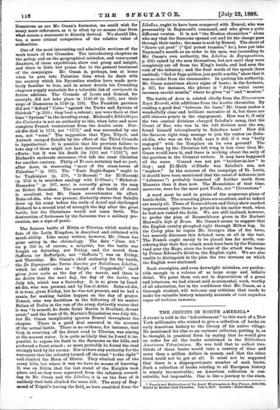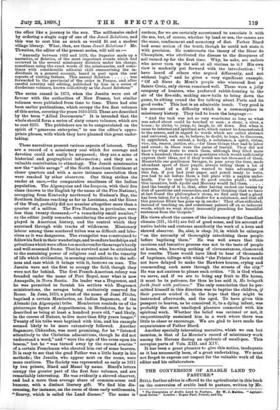THE JESUITS IN NORTH AMERICA.*
A STORY is told in the "Advertisement" to this work of a New York millionaire who wished to give a collection of books on early American history to the library of his native village. He mentioned his idea to an eminent collector, putting it, as he thought, in practical form by saying that he would give an order for all the books mentioned in the Bibliotheca Americana Vet ustissima. He was told that to collect two- thirds of these books would take a century of time and more than a million dollars in money, and that the other third could not be got at all. It must not be supposed that there is a disproportionate number of such books. Such a collection of books relating to all European history is simply inconceivable ; an American collection is con- ceivable, bat impossible. One is like a journey to the stars, • Travels and Brolorations of the Jesuit Mipsionariss in New Prance, 1610-1794 Edited by Reuben Gold Thwaitea. Vole 1.-X1V. London Elliot Stook.
the other like a journey to the sun. The millionaire ended by ordering a single copy of one of the Jesuit Relations, and
this was to cost him as much as would fit out a modest village library. What, then, are these Jesuit Relations? Mr. Thwaites, the editor of the present series, will tell 1115 :— " Annually between 3632 and 1673, the Superior made up a narrative, or Relation, of the most important events which had occurred in the several missionary districts under his charge, sometimes using the exact words of the missionaries, and some- times with considerable editorial skill summarising the in- dividuals in a general account, based in part upon the oral reports of visiting fathers. This annual Relation was forwarded to the provincial of the order in France, and after careful scrutiny and editing, published by him in a series of duodecimo volumes, known collectively as the Jesuit Relations."
The series ceased in 1673, when the Jesuits were out of favour with the authorities of New France, but similar volumes were published from time to time. There had also been earlier publications, which occupy the five first volumes of this series, covering the years 1610-1633. These are described by the term "Allied Documents." It is intended that the whole should form a series of sixty octavo volumes, which are to cost $210. The publishers are to be congratulated on the spirit of "generous enterprise," to use the editor's appro- priate phrase, with which they have planned this great under- taking.
These narratives present various aspects of interest. They are a record of a missionary zeal which for courage and devotion could not easily be surpassed; they are a mine of historical and geographical information; and they are a valuable contribution to ethnology. The Jesuit missionaries saw the "noble savage" of the North American Continent at closer quarters and with a more intimate association than were reached by other observars. One thing strikes the reader at once,—the comparative smallness of the Indian population. The Algonquins and the Iroquois, with their five clans (known to the English by the name of the Five Nations), occupying from Kentucky northward to Hudson's Bay, the Southern Indians reaching as far as Louisiana, and the Sioux of the West, probably did not number altogether more than a quarter of a million. The Five Nations, in particular, were less than twenty thousand,—" a remarkably small number," as the editor justly remarks, considering the active part they played in American history, and the control which they exercised through wide tracks of wilderness. Missionary labour among these scattered tribes was as difficult and labo- rious as it was dangerous. The evangelist was constrained to follow his flock in their wanderings, and to endure hardships and privations which were often too much even for the savage's hardy and well-seasoned frame. That he survived must be attributed to the sustaining power of religious zeal and to the tenacity of life which civilisation, in seeming contradiction to the soft- ness and ease which it brings with it, bestows on man. The Jesuits were not the first to occupy the field, though they were not far behind. The first French-American colony was founded under the name of Port Royal, near what is now Annapolis, in Nova Scotia. Its leader was a Huguenot, and he was permitted to furnish his settlers with Huguenot ministrations, the savages being exclusively reserved for Rome. In June, 1610, a priest of the name of Jesse Fleche, baptised a certain Membertou, an Indian Sagamore, of the Abenaki (an Algonquin) tribe. Membertou reminds us of the picturesque figure of Arganthonius, in Herodotus, for he is described as being at least a hundred years old, "and likely, in the course of Nature, to live more than fifty years longer."
Twenty of his tribe were baptised with him, and his example seemed likely to be more extensively followed. Another Sagamore, Chkaudan, was most promising, for he "listened attentively to the Christian admonitions, though he did not understand a word," and "wore the sign of the cross upon his bosom," but he "was turned away by the cursed avarice" of a certain Frenchman who cheated him out of some beavers. It is easy to see that the good Father was a little hasty in his methods ; the Jesuits, who appear next on the scene, were more cautious. The Society was represented as early as 1611 by two priests, Biard and Masse by name. Biard's letters occupy the greater part of the first four volumes, and are remarkably interesting. He was evidently a shrewd observer, and had a more than average share of common-sense and humour, with a distinct literary gift. We find him dis- coursing, for instance, on the curse of these early settlements, "Scurvy, which is called the Land disease." The name is curious, for we are certainly accustomed to associate it with the sea, but, of course, whether by land or sea, the causes are
the same, confinement and monotony of diet. Father Biard had some notion of the truth, though he could not state it with precision. He controverts the theory of the Sieur de Champlain, who attributed the disease to the dampness of soil turned up for the first time. Why, he asks, are sailor% who never turn up the soil at all victims to it ? His own view is modestly put forward with the introduction : "1
have heard of others who argued differently, and not.
without logic," and he gives a very significant example. " Of all Sieur de Mont's people who wintered first at Sainte Croix, only eleven remained well. These were a jolly company of hunters, who preferred rabbit-bunting to the air of the fire-side, making snow-balls to bring down the game, to sitting round the fire talking about Paris and its good cooks." This last is an admirable touch. Very good is
his account of a difficulty which is a commonplace in missionary history. They had to learn the language :— "And the task was not so very wearisome as long as what was asked about could be touched or seen : a stone, a river, a. house; to strike, to jump, to laugh, to sit down. But when it came to internal and spiritual acts, which cannot be demonstrated to the senses, and in regard to words which are called abstract and universal, such as, to believe, to doubt, to hope, to discourse, to apprehend, an animal, a body, a substance, a spirit, virtue, vice, sin, reason, justice, etc.,—for these things they had to labor and sweat ; in these were the pains of travail. They did not know by what route to reach them, although they tried more than a hundred; there were no guestures which would sufficiently express their ideas, not if they would use ten thousand of them. Meanwhile our gentlemen Savages, to pass away the time, made abundant sport of their pupils, always telling them a lot of nonsense. And yet if you wanted to take advantage of this fun, if you had your paper and pencil ready to write, you had to set before them a full plate with a napkin under- neath. For to such tripods do good oracles yield ; without this incentive, both Apollo and Mercury would fail them And the beauty of it is, that, after having racked our brains by dint of questions and researches, and after thinking that we have at last found the philosopher's stone, we find only that a ghost has been taken for a body, a shadow for a substance, and that all this precious Elixir has gone up in smoke ! They often ridiculed, instead of teaching us, and sometimes palmed off on us indecent words, which we went about innocently preaching for beautiful sentences from the Gospels."
His views about the causes of the inclemency of the Canadian climate (III., 55-61) are fall of good sense, and his account of native habits and customs manifestly the work of a keen and shrewd observer. So, also, is chap. 10, in which he enlarges. "on the necessity of thoroughly catechising these people- before baptising them." He was well aware that this cautious and tentative process was not to the taste of people at home, who, knowing nothing of circumstances, clamoured for results. These would have liked to hear of thousands of baptisms, tidings with which "the Printer of Paris would not have delayed to make the Hawkers hoarse, crying and commending such news through the streets of the city."
He was not anxious to please such critics. "It is God whoim we serve, and if we are to bring any fruit to His house, it must be in patience, for thus he has said it, He bringetht
forth fruit with patience." The only consolation that he per- mitted himself in this direction was to baptise the children, if their parents wished it, in the hope that they might be instructed afterwards, and the aged. To have given this,
passport to heaven, as he conceived it, to a dying infant, was probably the most unalloyed pleasure connected with his. spiritual work. Whether the belief was rational or not, it unquestionably sustained him in a work where there was little to cheer or encourage. We are glad to have made the- acquaintance of Father Biard.
Another specially interesting narrative, whish we can but mention, is that of Le Mercier's record of missionary work among the Hurons during an epidemic of small-pox. This occupies parts of Vols. XIII. and XIV. It has been a great pleasure to give this notice, inadequate' as it has necessarily been, of a. great undertaking. We must not forget to express our respect for the valuable work of the editor and his collaborators.



































 Previous page
Previous page